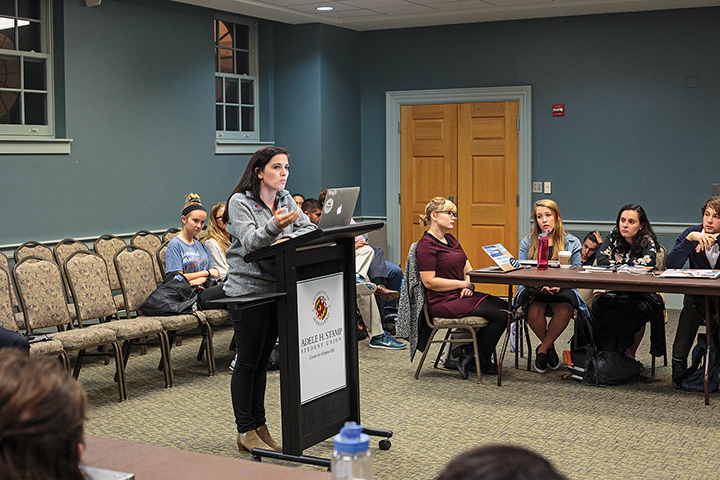The University of Maryland Student Government Association has passed a total of 19 acts and resolutions through 12 meetings of the 2016-17 legislative session. Some of these have been well-documented, such as the resolution that endorsed a $34 annual Title IX fee for students which the SGA later withdrew.
Other bills simply keep things running by approving student group funding allocations or SGA election rules and regulations.
But students may not be aware of some enacted bills, which have either already done their job or inspired progress on larger projects. Here’s a brief breakdown for four of those bills.
“A Resolution Sponsoring the 2016 On- and Off-Campus Safety Walk” (passed Sept. 21)
This bill continued SGA sponsorship of the annual event, which helps the community as well as university leaders to identify potentially unsafe areas on campus and the surrounding College Park area. SGA partnered with University of Maryland Police, the Residence Hall Association, Facilities Management and the College Park City Council to hold the walk, SGA President Katherine Swanson said. This year’s event was held Oct. 6.
“It’s been a really successful program for years in terms of making sure our immediate campus is reaching the point where it’s safe as it can be,” said A.J. Pruitt, SGA student affairs vice president.
“An Act Funding Buses to the College Park Early Voting Site” (passed Oct. 26)
The SGA was heavily involved in voter registration and participation during this year’s presidential election cycle. It helped register 4,847 new voters as part of the “Vote B1G Campaign.” The SGA also helped fund buses provided by the Department of Transportation Services that shuttled students to College Park’s early voting site at the College Park Community Center from Oct. 27 to Nov. 3, splitting the cost with the Graduate Student Government.
“The Government Affairs Committee and the entire legislature obviously believes in the democratic process and getting people to vote,” said the bill’s sponsor, off-campus representative James Mulholland. “Not everyone can make it out Nov. 8 to vote, so this is a way to give them a bit more of a chance to get out a little bit early.”
“A Resolution Supporting Student Transportation from Campus to Annapolis to Increase Accessible Educational Opportunities” (passed Nov. 2)
The Maryland Internship Program places students from this university in state government internships, but for students without cars, these opportunities were less accessible. As a result of the bill, the SGA will pilot a DOTS bus route to and from Annapolis on Tuesdays and Thursdays during the spring semester. From Jan. 10 to April 6, the buses will leave from Stamp Student Union at 8 a.m. and drop students off at Lawyers Mall near the State House by 9 a.m., and it will pick them up again at 5:15 p.m. Fasika Delessa, SGA academic affairs vice president, worked with eight departments and offices across campus to raise the $4,800 needed to fund the pilot program.
“A Resolution Urging the Individual Colleges of the University of Maryland to Mandate Sexual Misconduct Prevention Training into All UNIV100 and Equivalent Courses” (passed Nov. 9)
Students told the new Joint President/Senate Sexual Assault Prevention Task Force at its open forum Nov. 17 that in-person sexual misconduct prevention training would be more beneficial for freshmen than an online course. The week before, the SGA voted to recommend mandatory training to students in all UNIV100 courses and their equivalents, such as HONR100.
Taylor Aguiar, the SGA sexual misconduct prevention director, who gave a favorable committee report on this bill, sits on the task force. The bill does not specify a standard form of training to be administered to UNIV100 students because “if we later find out that that’s not the best option, then we’re stuck,” Aguiar said on Nov. 9.



